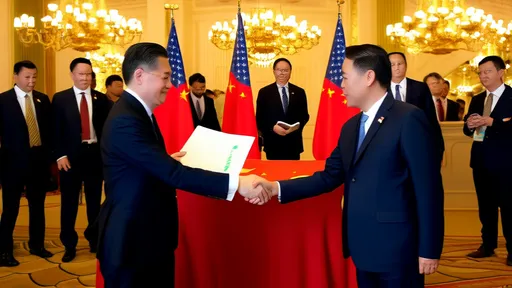The recent passage of the "TikTok Ban or Divest" bill in the U.S. has sent shockwaves through the tech and geopolitical landscape, placing ByteDance, the Chinese parent company of TikTok, at the center of an escalating tug-of-war between Washington and Beijing. The legislation, which demands that ByteDance either sell its U.S. operations or face a nationwide ban, underscores the deepening fissures in U.S.-China relations and raises critical questions about the future of global tech governance. For ByteDance, navigating this high-stakes dilemma requires more than just legal maneuvering—it demands a delicate balancing act between compliance, survival, and strategic innovation.
At its core, the U.S. government’s move reflects longstanding concerns over data security and the potential for Chinese influence via TikTok’s algorithm. Lawmakers and intelligence officials have repeatedly warned that the app’s ties to Beijing could compromise national security, allegations ByteDance has consistently denied. Yet, the bipartisan support for the bill signals a hardening stance against Chinese tech firms operating in America, regardless of their commercial success or user base. With over 170 million American users, TikTok isn’t just a social media platform; it’s a cultural phenomenon. Its abrupt removal would leave a vacuum in the digital ecosystem, one that competitors like Meta and Google are eager to fill.
For ByteDance, the immediate challenge is to explore alternatives that don’t involve outright capitulation. A forced sale of TikTok’s U.S. operations would not only be a financial blow but also set a precedent for other Chinese companies facing similar pressures. However, finding a buyer capable of meeting the app’s valuation—estimated at tens of billions—is no easy task, especially with Beijing likely to oppose any transfer of core technology. Earlier attempts to broker deals, such as the Oracle-Walmart partnership in 2020, collapsed under regulatory and political scrutiny. This time, the hurdles are even higher.
One potential path forward is a structural overhaul that distances TikTok’s U.S. operations from its Chinese roots without a full divestiture. ByteDance has already taken steps in this direction, storing American user data on servers outside China and partnering with U.S. firms for oversight. Yet, these measures have failed to appease Washington’s hawks. A more radical approach could involve spinning off TikTok into an independent entity with a U.S.-based board and transparent governance—a move that might satisfy regulators while allowing ByteDance to retain some economic interest. But even this middle ground faces skepticism, as critics argue that any lingering connection to China would pose an unacceptable risk.
The geopolitical undertones of this showdown are impossible to ignore. The TikTok bill is just one front in a broader U.S. campaign to curb China’s technological ascendancy, spanning semiconductors, AI, and clean energy. Beijing, meanwhile, has framed the crackdown as evidence of American protectionism and hypocrisy, accusing the U.S. of stifling competition under the guise of national security. For Chinese leaders, allowing ByteDance to succumb to U.S. demands would be a symbolic defeat, emboldening further restrictions on other homegrown champions like Huawei or Shein. The result is a zero-sum game where compromise seems increasingly elusive.
Amid this impasse, ByteDance may need to look beyond traditional solutions. Legal challenges are already underway, with TikTok preparing to argue that the bill violates free speech and due process rights. A protracted court battle could buy time, but it’s unlikely to resolve the underlying tensions. Alternatively, ByteDance could leverage its global footprint to pivot toward markets where geopolitical risks are lower, though this would mean sacrificing its lucrative U.S. audience. Another wildcard is the 2024 U.S. election: a change in administration could soften the current hardline stance, though bipartisan consensus on China suggests otherwise.
What’s clear is that ByteDance’s predicament transcends corporate strategy—it’s a litmus test for how tech giants can operate in an era of fractured globalization. The company’s ability to forge a "third way"—neither fully acquiescing nor retreating—could redefine the rules of engagement for multinationals caught between superpowers. Whether through innovative governance models, legal resilience, or diplomatic backchannels, the outcome will reverberate far beyond TikTok, shaping the future of cross-border tech innovation in an age of suspicion and rivalry.
As the clock ticks down on ByteDance’s deadline to comply, the world is watching. The company’s next moves will reveal not just its adaptability but also the limits of power in a digital world where technology, politics, and culture collide. For now, the search for a middle path continues—a path that may yet redefine the boundaries of sovereignty, security, and survival in the 21st century.

By /Jun 23, 2025

By /Jun 23, 2025

By /Jun 23, 2025

By /Jun 23, 2025

By /Jun 23, 2025

By /Jun 23, 2025

By /Jun 23, 2025

By /Jun 23, 2025

By /Jun 23, 2025

By /Jun 23, 2025

By /Jun 23, 2025

By /Jun 23, 2025

By /Jun 23, 2025

By /Jun 23, 2025

By /Jun 23, 2025

By /Jun 3, 2025

By /Jun 3, 2025